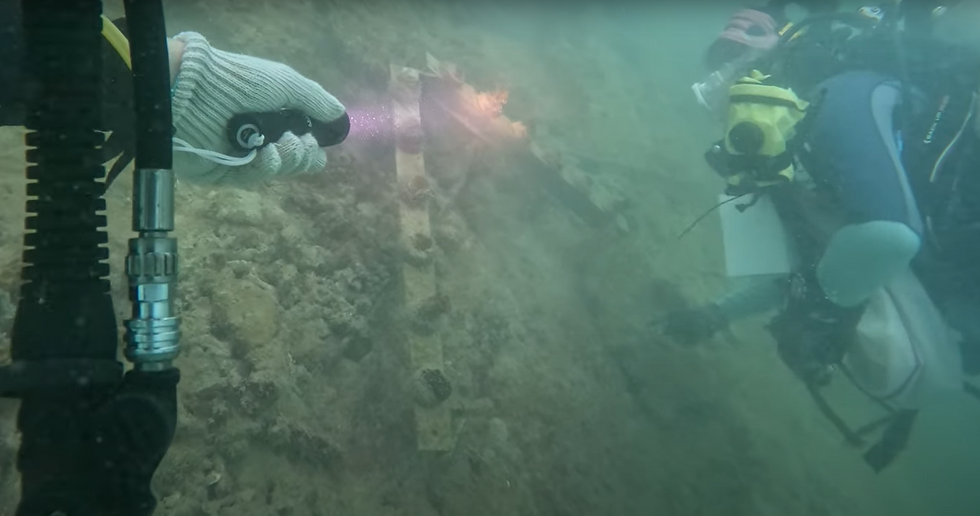Dive Clean-up
- Lotus Circle
- Sep 24, 2023
- 4 min read
19th August 2023
I was very fortunate to be able to join for a dive clean-up with such short notice. I managed to purchase some dive equipment for my first dive on Saturday, including a GoPro camera, dive knife, and torch. I was feeling very excited and slightly nervous as it was my first time going for a dive clean-up in Singapore.
When we first reached the dive point, which was at Kusu Island, the divers immediately mentioned that the visibility seemed great - an event that was rare in Singapore owing to the sentiments flying up due to the moving vessels. To give some context, the normal visibility range was 50cm to 2m, but that day it was about 5m. Anyway, we got geared up and proceeded with the dive. For today there was a special operation, it was a dive recovery for heavy objects - mattresses that were dumped by cargo ships and various other objects that were too heavy for us recreational divers to retrieve. OSR had partnered with the Marine Park Authority (MPA) to fire professional technical divers to retrieve the heavier objects. Our task was to head down and tag these found items with some sort of floating marker so that the team of professional divers could head down to the spot to retrieve them efficiently. So we split into smaller teams and I followed Sam down.
It was really an interesting dive for me, I even recorded the dive footage and published it on YouTube so that I can document it:
When we headed down, we found an assortment of rubbish. An interesting point was when we had to untangle and cut some fishing lines that got caught among some branching corals. It was exceptionally challenging for me because I had to maintain the correct buoyancy while trying to delicately remove the line and avoid hurting the corals. The surface surge currents also made it exceedingly hard for me to stay in the same spot.

Afterward, we also had a tour by one of the divers who was conducting marine biology research in NUS. She showed us a bunch of coral farms where the scientists attempted to grow these corals in the form of nurseries in different configurations. There were also some devices that allowed corals, anemones, and some fishes to seek shelter and grow. I was fascinated by the variety of marine life and corals that thrived in Singapore waters as I initially thought that there would be little or no marine life, considering that the sea in Singapore was commonly seen to be dirty. But in fact, it was the opposite, as seen by my videos, there was an abundance of marine life and there was a part where the entire sea floor was covered with sea anemones that danced gracefully to the ocean currents.


We surfaced up and after a short break, we proceeded with the second dive. This time we focused more on retrieving trash on the sea bed. We found items life spray cans, metal bars and lots of rice sacks. The rice sacks posed an issue as they were heavy and large in numbers. To make things worse, the rice sacks has so much mud in them that when we picked them up, it started to cloud our vision. It reached a point where I could not see anything at all and I almost started panicking. Thankfully I had a torch on, and my supervisor, Sam came to find me and we moved away to a part of the ocean where it was clearer. It became clear to me that when I was diving, it was crucial to keep a calm composure to avoid any risk of incident and anticipate incidents like these.
After surfacing from the second dive, we had to consolidate the rubbish and sort them out on a plastic tarp. This is because on top of our clean-up, OSR also actively participates in a PADI program called "Dive against debris".This is a program aimed at collecting data that contributes to marine research. So the data collected actually helps out 2 scientific publications, which map out the global state of marine debris. With the data collected, they will be able to know what kinds of rubbish are found, and what are the quantities as well as their location. So we had to use a checklist and count how many of each item there is, as well as record the total weight of the rubbish collected. Here are some photos of what we had found:



Overall, my first dive provided me with a very insightful overview of what was required for a dive clean-up which I summarised in a few points:
Excellent Buoyancy control - prevent damage to corals, removal of lines from corals
Clear and direct communication - can't speak underwater, detailed briefing before dive is often required to prevent confusion
Good planning and anticipation - proper gear and knowing the tide conditions such as current, surge and visibility
Calm composure - avoid panicking and allows for clear thinking in a challenging situation
I am deeply grateful that I joined OSR and was surrounded by a team of wonderful divers who looked out for me during my first dive. Here's to having more dives!






Comments